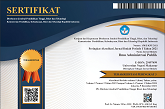The International Context of Indonesia's Omnibus Law: A bibliometric review
(1) Universitas Negeri Makassar
(*) Corresponding Author
DOI: https://doi.org/10.26858/jiap.v12i1.34759
Abstract
Keywords
Full Text:
PDFReferences
Adhistianto, M. F. (2020). Politik Hukum Pembentukan Rancangan Undang- Undang Cipta Kerja (Studi Klaster Ketenagakerjaan). Pamulang Law Review, 3(1), 1–10.
Allen, C. D. (2018). Who loses public health insurance when states pass restrictive omnibus immigration-related laws? The moderating role of county Latino density. Health & Place, 5(4), 20–28.
Allen, C. D., & McNeely, C. A. (2017). Do restrictive omnibus immigration laws reduce enrollment in public health insurance by Latino citizen children? A comparative interrupted time series study. Social Science & Medicine, 1(91), 19–29. https://doi.org/https://doi.org/10.1016/j.socscimed.2017.08.039
Bagja, H. N. (2021). The legal aspect of changing the Final Income Tax as a tax incentive for MSMEs during the covid-19 period in Indonesia. Turkish Journal of Computer and Mathematics Education (TURCOMAT), 12(8), 322–326.
Benuf, K., & Azhar, M. (2020). Metodologi Penelitian Hukum sebagai Instrumen Mengurai Permasalahan Hukum Kontemporer. Gema Keadilan, 7(1), 20–33.
Borsuk, R. (2021). Worsened by the Pandemic. Indonesia’s Joblessness
Catur, J. S., Djongga, D., Heriyandi, H., Poerwanto, H., Hutasoit, J., Anam, K., & Wiyono, B. (2020). Perlindungan Hukum Terhadap Kesejahteraan Pekerja Melalui Undang-Undang Nomor 11 Tahun 2020 Tentang Cipta Kerja. Jurnal Lex Specialis, 1(2).
Chairil, T. (2020). Indonesian Government’s COVID-19 Measures, January–May 2020: Late Response and Public Health Securitization. Jurnal Ilmu Sosial Dan Ilmu Politik, 24(2), 128–152.
Chander, A. (2013). How Law Made Silicon Valley. Emory LJ, 63(639).
Fealy, G. (2020). Jokowi in the Covid-19 Era: Repressive Pluralism, Dynasticism and the Overbearing State. Bulletin of Indonesian Economic Studies, 56(3), 301–323.
Gellert, P. K. (2019). Neoliberalism and altered state developmentalism in the twenty-first century extractive regime of Indonesia. Globalizations, 16(6), 894–918.
Kaharudin, D. (2020). Penataan Legislasi Di indonesia Melalui omnibus Law Perspektif Undang-undang no 12 Tahun 2011 Tentang Pembentukan Peraturan Perundang-undangan.
Khozen, I., Saptono, P. B., & Ningsih, M. S. (2021). Questioning Open Government Principle within the Law-Making Process of Omnibus Law in Indonesia. Soshum: Jurnal Sosial Dan Humaniora, 11(2), 143–154.
Kurnia Saleh, S. H. (2020). Catatan Negara Hukum Demokratis. In Guepedia.
Mahy, P. (2021). Indonesia’s Omnibus Law on Job Creation: Reducing Labour Protections in a time of COVID-19 (Labour, Equality and Human Rights (LEAH) Research Group).
Mietzner, M. (2020). Populist anti-scientism, religious polarisation, and institutionalised corruption: How Indonesia’s democratic decline shaped its COVID-19 response. Journal of Current Southeast Asian Affairs, 39(2), 227–249.
Prasetio, R. B. (2021). Pandemi Covid-19: Perspektif Hukum Tata Negara Darurat dan Perlindungan HAM. Jurnal Ilmiah Kebijakan Hukum, 15(2), 327–346.
Samawati, P., & Sari, S. P. (2020). Problematic of The Draft of Omnibus Law On Job Creation in Indonesian. Journal of Xi’an University of Architecture & Technology XII, 3.
Suhardityo, B. (2020). Analisis Siyasah Dusturiah terhadap keberadaan konsep Godly Constitution dalam Putusan Mahkamah Konstitusi nomor: 97/PUU- XIV/2016 tentang Pencantuman Aliran Penghayat Kepercayaan pada kolom agama di E-KTP. UIN Sunan Ampel Surabaya.
Titko, E., Kurovska, I., Korniienko, P., Balzhyk, I. A., & Stoyatska, G. M. (2021). Military-civil interaction through the prism of human rights protection: the experience of the ECtHR. Linguistics and Culture Review, 5(3), 649–666. https://doi.org/https://doi.org/10.21744/lingcure.v5nS3.1550
Yan Ing, L., & Losari, J. J. (2021). The EU—China Comprehensive Agreement on Investment: Lessons Learnt for Indonesia. China Economic Journal, 14(2), 200–221.
Yu, H. (2017). Motivation behind China’s ‘One Belt, One Road’initiatives and establishment of the Asian infrastructure investment bank. Journal of Contemporary China, 26(105), 353–368.
Yuniar, V. S. (2021). Legal Protection For Foreign Investment In The Mineral And Coal Mining Sector In Indonesia. Dialogia Iuridica: Jurnal Hukum Bisnis Dan Investasi, 12(2), 102–114.
Article Metrics
Abstract view : 282 times | PDF view : 73 timesRefbacks
- There are currently no refbacks.
Copyright (c) 2022 Mustaring Mustaring

This work is licensed under a Creative Commons Attribution 4.0 International License.
Diterbitkan oleh:
Program Studi Ilmu Administrasi Publik
Program Pascasarjana Universitas Negeri Makassar
JIAP Index By:

This work is licensed under a Creative Commons Attribution 4.0 International License.









